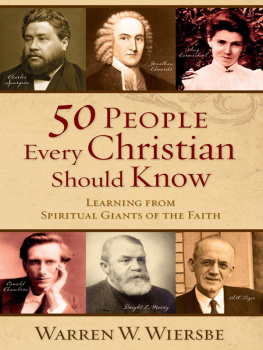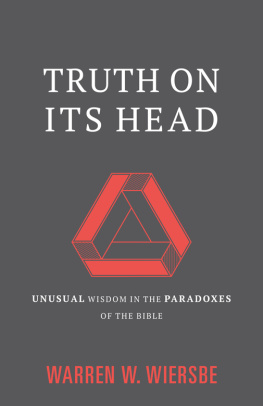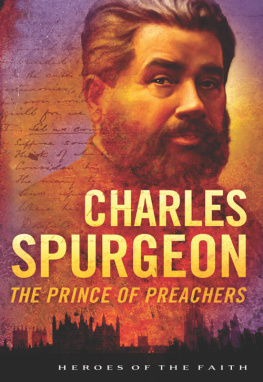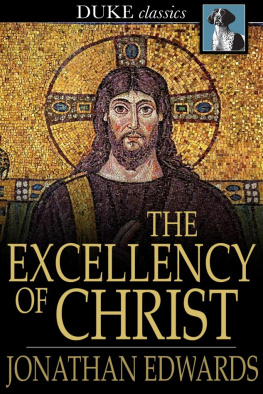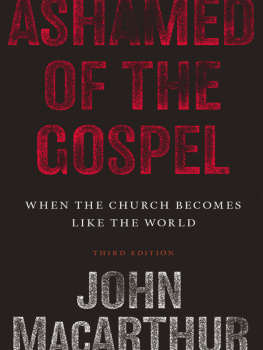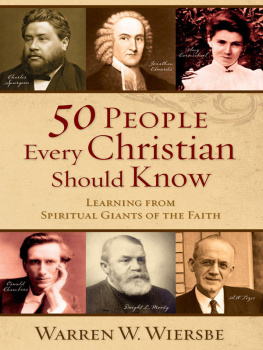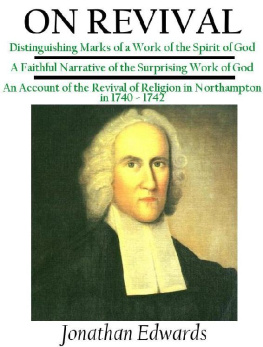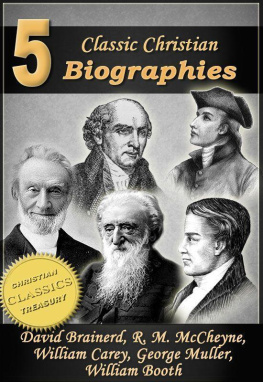People Every
Christian
Should Know
People Every
Christian
Should Know
Learning from Spiritual
Giants of the Faith
Warren W. Wiersbe

2009 by Warren W. Wiersbe
Published by Baker Books
a division of Baker Publishing Group
P.O. Box 6287, Grand Rapids, MI 495166287
www.bakerbooks.com
Previously published as two separate titles
Living with the Giants, 1993 by Warren W. Wiersbe
Victorious Christians You Should Know, 1984 by Good News Broadcasting Association, Inc.
Combined edition published 2009
Ebook edition created 2015
Ebook corrections 05.27.2015
All rights reserved. No part of this publication may be reproduced, stored in a retrieval system, or transmitted in any form or by any meansfor example, electronic, photocopy, recording without the prior written permission of the publisher. The only exception is brief quotations in printed reviews.
Library of Congress Cataloging-in-Publication Data is on file at the Library of Congress, Washington, DC.
ISBN 978-1-4412-0400-4
Chapters 2, 9, 12, 1521, 23, 2529, 31, 3339, 41, 42, 44, 4850 19711977 by the Moody Bible Institute, reprinted by permission of Moody Monthly. Chapter 24 1984, 1985 by Back to the Bible. Reprinted by permission.
Chapters 1, 38, 10, 11, 13, 14, 22, 30, 32, 40, 43, 45, 46 originally appeared as articles in Good News Broadcaster, copyright by The Good News Broadcasting Association, Inc., Lincoln, NE 68501. Used with permission.
Contents
T hese brief biographies originally appeared as magazine articles, thirty-two of them in Moody Monthly magazine (197177) and sixteen in The Good News Broadcaster, published by Back to the Bible Broadcast. The Moody Monthly articles were compiled into Walkingwith the Giants and Listening to the Giants, both published by Baker; and the others into Victorious Christians You Should Know, co-published in 1984 by Back to the Bible and Baker. The biographies from the two Giants books later became Living with the Giants, which was published by Baker in 1993.
At the request of the publisher, I wrote the chapters on Clarence Edward Macartney and Alva Jay McClain especially for this volume.
It pleases me that there is still an interest in Christian biography. One of the goals in my writing ministry has been to encourage Christiansespecially pastorsto dig again the old wells (see Gen. 26:18) and get acquainted with the godly leaders of the past who kept the light shining long before we were ever on the scene. I have heard from people in different parts of the world who have read these studies and been helped by them. Many of my readers have especially appreciated the bibliographical information and have searched for these forgotten books. I hope they found them!
Many Christians today are so fascinated with the latest religious fads and celebrities that they forget that all of us are like dwarfs on the shoulders of giants, to quote the French philosopher Bernard of Chartres (d. c. 1130). In his essay History, Emerson reminds us, There is properly no history; only biography. I rejoice that in recent years, at least in the United States, there have been an increase in published biographies, both popular and academic, and I hope this continues. We must remember the warning issued by George Santayana, Those who cannot remember the past are condemned to repeat it.
The past is not an anchor to drag us back but a rudder to help guide us into the future. I have been helped greatly in my own life and ministry by reading the hundreds of biographies, autobiographies, and histories that have enabled me to write these chapters, and I trust you will benefit from reading them. When I started the Moody Monthly series, I was pastoring Calvary Baptist Church in Covington, Kentucky, near Cincinnati. Then we moved to Moody Church in Chicago (197178) and then to Back to the Bible Broadcast in Lincoln, Nebraska (197989).
The magazines I once wrote for are no longer being published. Im grateful that these articles can be conserved in this volume, and I trust they will inform and inspire you.
Warren W. Wiersbe
Katherine von Bora
14991552
N ovember 10, 1983, marked the five hundredth anniversary of the birth of Martin Luther. We have heard a great deal about this courageous reformer and his ministry. But I want to focus our attention now not on Luther the preacher and leader, but on Luther the husband and father; for I want you to meet Katherine von Bora, the nun who became Martin Luthers devoted wife. He called her Kitty, my rib, and he loved her dearly.
Katherine was born January 29, 1499, at Lippendorf, Germany, about six miles south of Leipzig. When her mother died five years later, her father put Katherine into a boarding school, and then, when she was nine, placed her in the Cistercian convent at Nimbschen in Saxony. It was not an easy place for a little girl to grow up, but at least she had protection, food, and friends. On October 8, 1515, she was married to Christ and officially became a nun. Little did she realize that, two years later, a daring Wittenberg professor named Martin Luther would nail his ninety-five theses to the church door and usher in a religious movement that would change her life.
As the Reformation doctrine spread across Germany, numbers of monks and nuns became believers and sought to escape from their convents and monasteries. Some of the nuns who sought freedom were severely punished, and some who escaped were brought back into even worse bondage. Twelve nuns at the Nimbschen convent somehow got word to Luther that they wanted to get out, and he arranged for their escape.
On Easter evening, April 5, 1523, a brave merchant and his nephew, Henry and Leonard Koppe, drove a wagonload of barrels into the convent, put each of the twelve nuns into a barrel, and drove away. When a suspicious man asked Koppe what he was carrying in the barrels, he replied, Herring. Three of the girls were returned to their homes, but the other nine were taken to Wittenberg where husbands would be found for them. Two years later all of them had husbandsexcept Katherine von Bora.
Luther did his best to match her with a godly husband, but all his attempts failed. The one man she really fell in love with ran off and married another girl. Luther urged her to marry Pastor Casper Glatz, but she refused. She was living with some of the leading citizens in Wittenberg and learning how to be a lady and manage a household, so those two years of waiting were not wasted. Finally, she let it be known that if Doctor Luther were to ask her to be his wife, she would not say no.
It was not that Luther was against marriage, but he knew that he was a marked man and that, if he married, he would only put his wife and family into great danger. He urged others to marry, if only to spite the devil and his teaching (the policy of Rome concerning married clergy). How could a man who was declared a heretic by the pope and an outlaw by the Kaiser take a wife and establish a home?
But as the months passed, Luther weakened. He wrote to a friend, If I can swing it, Ill take my Kate to wife ere I die, to spite the devil. Not the least of Luthers concerns were the economic factors involved in marriage. He accepted no payment or royalties for his books, his own income was unsteady and meager, and he was known for his generosity to anybody in need. If he wanted to deprive himself that was one thing, but did he have the right to force his wife to make such constant sacrifices?
On June 13, 1525, Dr. Martin Luther and Katherine von Bora were married in a private ceremony at the Black Cloister, the converted monastery where Luther lived. As per the custom, two weeks later there was a public ceremony at the church. A host of friends attended, and the couple received many choice gifts. Of course, the enemy immediately circulated slanderous stories about the couple, but few people believed them. One man even said that their first child would be the Antichrist.
Next page
